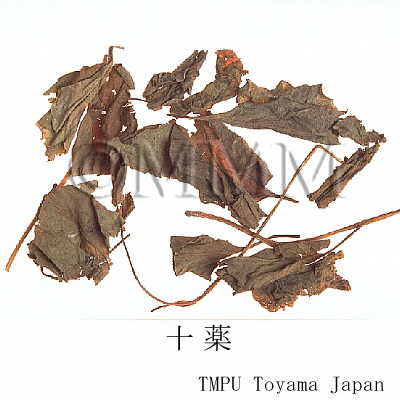※Click on the image to enlarge it.
| Common name | 十薬(魚腥草), Jūyaku (Yuxingcao), Houttuyniae Herba (JP18, CP2020), Houttuynia Herb (JP18), Heartleaf Houttuynia Herb (CP2020) |
|---|
| Synonyms | 魚腥草 (Yuxingcao) |
|---|
| crude drug image |  |
※Click on the image to enlarge it. |
|
|---|
| Original plant name | Houttuynia cordata Thunberg, (Dokudami) |
|---|
| original plant image |  |  |
※Click on the image to enlarge it. |
|
|---|
| Family name | Saururaceae |
|---|
| Used part | aerial part in flower season |
|---|
| Quality for selection | Good Jūyaku is fresh. The leaves remain green even after dried. (TN) |
|---|
| Official compendium | JP XVIII, CP (2020 ed.) |
|---|
| Clinical application | As an antifebrile, antidote, antiinflammatory and diuretic agent, Jūyaku is applied for carbuncles, sore, anal prolapse, hemorrhoids and insect poison. In Japan, it is used for constipation, cold and empyema by decoction, and the raw leaf is for hemorrhoids, swelling and lumbago, as the medical plaster or bath agent. |
|---|
| Medical system | Traditional Chinese medicine |
|---|
Drug effect in
traditional medicine | Traditional
classification | Febrifugal and detoxicant drugs |
|---|
| Beneficial effect | [Property and Flavor] Mild cold; pungent.
[Meridian Tropism] Lung meridian.
[Actions] To clear heat and remove toxin, disperse abscesses and expel pus, disinhibit urine and relieve stranguria.
[Indications] Lung abscess with pyemesis, phlegm-heat panting and cough, heat dysentery, heat strangury, swelling abscess, sore and toxin. |
|---|
| Chemical constituent | Other aliphatic and related compounds
(*C1, *C2):
Decanoylacetaldehyde, Lauryl aldehyde(=n-Dodecanal), Methyl-n-nonyl ketone, Capryl aldehyde, 3-Ketodecanal
Monoterpenoids
(*C1):
Myrcene
Flavones & Flavonols
(*C1):
Quercitrin, Isoquercitrin, Afzerin
Sulfur containing compounds
(*C1):
Methyl lauryl sulfide
Others
(*C1):
K塩
|
|---|
| Chemical structure | |
|---|
| Pharmacological effect | Quercitrin: cardiologic, increase in the blood pressure, dilation of renal blood vessel, antibacterial (fungus). Houttuynia Herb extract: diuresis, miosis, decrease in the blood pressure. The extract of ethyl acetate inhibits 3alpha-hydroxysteroid dehydrogenase activity. Quercetin is the strongest component which has that kind of action. |
|---|
| DNA sequence | AF203629, AF206929, L08762, L24147 |
|---|
Classical reference
(Chinese Herbal Classic "Zhenglei bencao") |  ※Click this image to see the actual image ※Click this image to see the actual image |
|---|
| Disease | Lung suppurations, Pyogenic dermatosis, External hemorrhoid, Dysuria, Urodynia, Diarrhea, Tenesmus |
|---|
| Formulation | |
|---|
| References | JP18: The 18th edition of the Japanese Pharmacopoeia.
CP2020: Pharmacopoeia of the People's Republic of China 2020 edi.
C1) The Encyclopedia of Wakan-Yaku with Color Pictures Vol. II, pp 35-36.
C2) Outline of Pharmacognosy, a Textbook, p 300. |
|---|
| Remarks | Raw leaves are also used folklorically. It is called Yuxingcao in China, and Jūyaku or Dokudami in Japan. It is taken as food in Sichuan Prov., China and Vietnam. |
|---|
| Last renewal date | 2021/09/27 |
|---|
| | |
|---|








